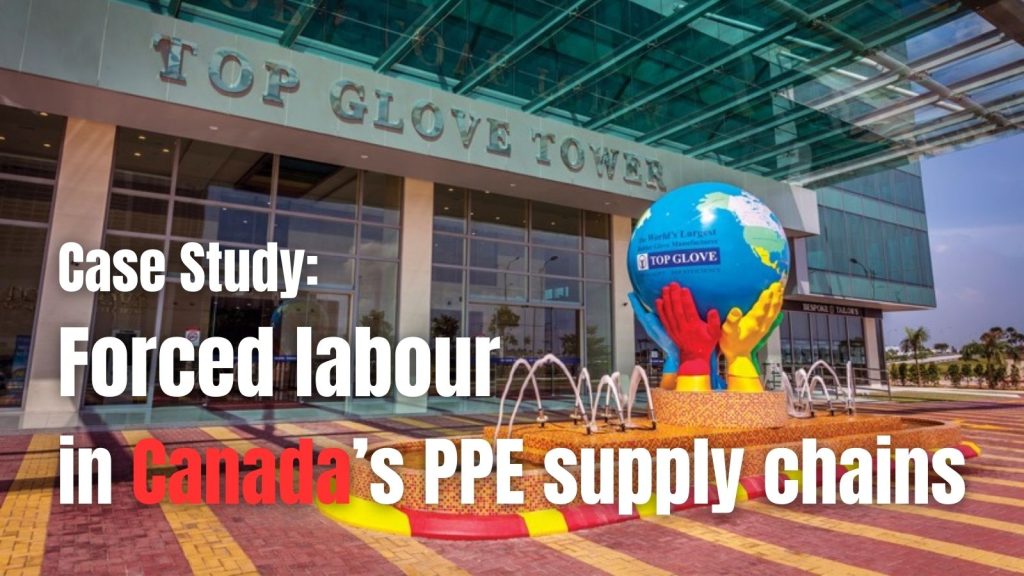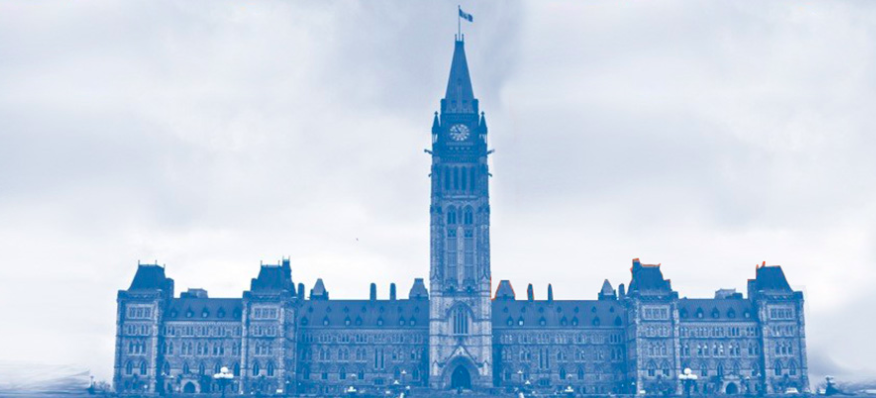Photo: Entrance of Top Glove Tower (Wikimedia Commons)
Case 3 of 6 [1]
[View PDF]
Summary
- In 2018, allegations of labour violations and forced labour at Malaysian factories owned by the world’s largest rubber glove producer, Top Glove,[2] made international news. In July 2020, U.S. Customs and Border Protection (CBP) barred imports into the U.S. of goods linked to Top Glove. The agency said it “had found evidence of forced labour practices” at Top Glove facilities.
- In January 2021, it was revealed that at least 18 Canadian companies had imported into Canada Personal Protective Equipment (PPE) from Top Glove,[3] despite the U.S. ban.[4]
- In response to the U.S. ban, Top Glove committed to improving its labour conditions and stopping the use of forced labour. CBP lifted the ban in September 2021.[5]
- In January 2022, allegations of forced labour linked to another Malaysian glove manufacturer, Supermax Corp., hit international headlines. CBP had barred imports from Supermax in October 2021, but its products were nonetheless being imported into Canada by Supermax Healthcare Canada, which had contracts with Public Services and Procurement Canada for distribution to Canadian healthcare facilities. Supermax says it has “remediated” the allegations that formed the basis of the U.S. ban and expects the ban to be lifted in the near future.[6]
The Detail
Malaysia produces approximately 70% of the global supply of rubber gloves, including those used by Canadian hospitals and health care facilities during the COVID-19 pandemic.[7] Reports of workplace injuries, excessive hours and cramped living quarters at Malaysian glove factories have been well documented by human rights organizations.[8] Most of the workers at Malaysian glove factories are migrant workers from neighbouring countries who pay high fees to recruitment agencies to gain access to employment. A July 2021 study by the Modern Slavery & Human Rights Policy and Evidence Centre in the UK, which surveyed approximately 1,491 workers and carried out interviews with migrant workers, manufacturers and government officials, revealed that with the onset of the pandemic, pressure on workers to meet increased production goals and overall working conditions at factories worsened. This contributed to a range of abuses characterized as forced labour,[9] as defined by the International Labour Organization’s forced labour indicators.[10] These abuses include:
- factory management taking advantage of workers’ vulnerability, especially those with precarious migratory status;
- deception by recruitment agencies and employers about the terms of work contracts in relation to hours worked for the pay received;
- physical and sexual violence, intimidation and threats to deter workers from raising concerns related to high recruitment fees – which often leave workers with large amounts of debt – or other grievances; and
- workers’ passports being retained by the recruitment agency, making it impossible for workers to leave the country or produce proof of their migratory status if stopped by police.
Finally, during the pandemic, the situation at Malaysian glove factories worsened, with a marked increase in restrictions on movement, isolation, abusive working and living conditions, and excessive overtime.[11]
Top Glove
In the case of Top Glove, Malaysia’s largest rubber glove producer, reports dating back to at least 2018 show migrant workers working excessive hours to pay off debts to recruiters. The company’s managing director at the time vowed to put a stop to this practice.[12] Just over two years later, however, CBC Marketplace aired a special documenting insider footage of Top Glove workers’ ongoing dangerous living conditions, debt bondage, excessive work hours, abusive working conditions, and cramped living quarters where approximately 25 people sometimes shared a single room with a common bathroom.[13]
In July 2020, U.S. Customs and Border Protection (CBP) banned goods produced by some of Top Glove’s Malaysian subsidiaries under the suspicion that their goods were being made with forced labour.[14] In March 2021, CBP confirmed that it “found forced labour practices” in factories linked to Top Glove.[15] A provision in the Canada-United States-Mexico Agreement (CUSMA), which came into effect in July 2020, makes it illegal for Canadian companies to import goods made with forced labour.[16] However, according to Above Ground, Canada has not acted swiftly or effectively to address issues of forced labour in Canadian companies’ supply chains.[17] Canada has failed to effectively enforce the new forced labour provision and Canadian companies continued to import gloves from at least one Malaysian Top Glove factory.[18]
Since 2018, at least 18 companies, including Medline Canada and Superior Glove,[19] have imported goods into Canada from Top Glove and its subsidiaries.[20] In September 2021, the U.S. lifted its ban after confirming that the manufacturing giant had “addressed all indicators of forced labor identified at its Malaysian facilities.”[21]
Supermax
In another case of alleged forced labour at a Malaysian glove factory, Canada continued to allow goods linked to Supermax Corp. to enter the country – despite a Withhold Release Order (WRO) issued by CBP in October 2021 which barred imports from this manufacturer.[22] One of the buyers importing into Canada was Supermax Healthcare Canada, a company that supplies medical gloves to Public Services and Procurement Canada (PSPC), the government agency responsible for procuring medical equipment and supplies for Canadian health and essential service sectors.[23] While PSPC ultimately put a hold on deliveries from Supermax Healthcare Canada and terminated its contracts with the company while the allegations at its Malaysian supplier factory were being investigated,[24] the products themselves were never formally banned from entering Canada.[25] According to Above Ground, Canada Border Services Agency (CBSA) has not effectively enforced its provision against importing goods made with forced labour. According to CBSA, the agency “may take enforcement action only in rare cases…[and] doesn’t plan to publicly report which companies are involved.”[26]
Canada’s lukewarm response to this major human rights issue is concerning. It points to the government’s failure to ensure that Canadian companies carry out effective human rights due diligence throughout their supply chain. Canada’s approach to uncovering egregious human rights abuses in the supply chains of companies importing goods into Canada emphasises the need for a comprehensive and legally binding approach to ensure products made for Canadian markets – including lifesaving PPE – are not made using forced labour, or under other conditions that violate workers’ rights and safety.
What if…?
If mandatory human rights due diligence legislation had been in place, what would have been different for workers in Malaysian glove factories?
- It would not have been as easy for companies like Medline Canada, Superior Glove, and Supermax Healthcare Canada to overlook the conditions at the factories from which their glove shipments were imported.
- If those companies had carried out an effective human rights assessment prior to contracting those factories, they could have taken steps to assure that the factories were not using forced labour and upon discovering the use of forced labour, could have chosen to do business elsewhere.
- They could have also collaborated with other buyers to assert leverage on the factory to cease and mitigate its practice of forced labour, and to implement mechanisms to monitor and prevent future abuses.
- If the abuses continued to occur, workers and/or labour and migrant rights supporters could have brought a suit to Canadian courts alleging Medline Canada, Superior Glove and Supermax Healthcare Canada’s failure to take adequate steps to identify, evaluate, mitigate or prevent the abuses.




